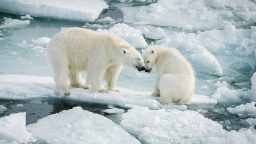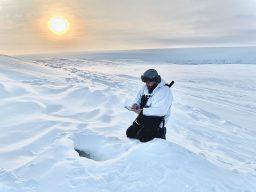
The Arctic. Photo: Leonid Kruglov
Over the past decade, large-scale projects aimed at the development of the Arctic have been implemented. The Russian Geographical Society (RGS) is working to study geophysical and hydrological processes in Arctic ecosystems, monitor the state of the environment and clean up the territory from man-made pollution.
It also acts as a link between academic institutions and organizations that carry out economic activities in a strategically important and ecologically fragile region. The RGS ensures a balance of interests, a constant flow of data necessary to make the right decisions, which avoids the shutdown of large investment projects, loss of time and invested funds.
It is extremely important to scale high-latitude scientific research, in the organization of which the Russian Geographical Society and the Association of Polar Explorers play a significant role. A new impetus to these studies will be given by the commissioning of the ice—resistant self-propelled platform “North Pole”. The problems of the Arctic and possible solutions are regularly discussed in the Russian Geographical Society.
The Arctic zone of Russia is developing rapidly today: new oil and gas fields are being developed, projects in the field of transport and logistics are being implemented. At the same time, it is important to keep in mind that the Arctic is a dynamically changing ecosystem that needs to be handled very carefully. Fundamental and applied scientific research will help to avoid environmental disasters in the future and solve social and economic problems for the development of the region.
— We work in all seas of Russia, and the Arctic seas are traditionally difficult, with the most severe hydrometeorological conditions here. Without a system of marine retrospective observations and constant monitoring, it is impossible to build a predictive model of optimal operation of the same Northern Sea Route, on which the well-being of many businesses depends. We have accumulated invaluable experience in continuous research, synchronizing with the expeditions of the Russian Geographical Society,” said Ivachev, Director of the Zubov State Oceanographic Institute.
Monitoring is an important component of Arctic exploration

The bay Is Quiet. Photo: Nikolai Gernet
Taisiya Shepitko, Director of the Institute of Roads, Construction and Structures of the Russian University of Transport, told how important it is to continue scientific support for the design, construction and operation of transport infrastructure facilities that have already been erected.
— A comprehensive innovative approach is needed in the community of science, business, production and regional authorities. For example, during four expeditions in 2019-2021, together with the Russian Geographical Society, we laid a geomonitoring network that allows us to monitor the condition of soils throughout the Northern Latitudinal Course – the railway line, which is planned to be laid to Norilsk and Dudinka. This is a stand-in for the Northern Sea Route — together they create a reliable transport system,” said Shepitko.
Mikhail Grigoriev, Deputy Director for Scientific Work at the Melnikov Permafrost Institute, noted the importance of continuity of scientific research from the perspective of monitoring and training of personnel. — Thank you that during your expeditions – complex, expensive, using helicopters and Navy vessels – we have the opportunity to turn young scientists into professional researchers, — Grigoriev said.
Vladimir Minligareev, Deputy Director for Scientific Work at the Fedorov Institute of Applied Geophysics, pointed out the need to monitor the upper geosphere. — Space weather and changes in the Earth’s geomagnetic pole – it is moving towards Taimyr – affect the state of the Arctic more strongly than human activity. It is all the more important to monitor solar activity ahead of its expected peak in 2025.
There are many examples in the history of the 20th century when increased activity disabled complex devices and led to the paralysis of entire industries. During the expedition with the Russian Geographical Society in April 2020, we managed to make a world discovery – to determine the exact position of the Earth’s South Magnetic Pole. With this groundwork, we continue research in the Russian Arctic,” said Minligareev.
Alexey Sobisevich, Deputy Director for Scientific Work, Chief Researcher at the Schmidt Institute of Earth Physics, stressed the importance of geophysical monitoring. — The situation needs dynamic monitoring. For example, recently a new seismic activity was detected on the tiny island of Belukha near the coast of Taimyr. The network of seismological observation stations is able to monitor areas of increased activity in advance and prevent risks,” he noted.
Advanced technologies for polar regions

A sea vessel among the ice
Yuri Vasiliev, Executive Director of the Institute of Arctic Technologies at MIPT, spoke about plans to build the world’s first autonomous hydrogen-powered scientific and educational complex “Snowflake”. One of the key goals of this project is to demonstrate the capabilities of Arctic hydrogen energy. His second task is to establish interaction between industry and applied science. —Snowflake is a group of polygons for launching a series of new technologies,— Vasiliev explained.
A scientific session moderated by the author and producer of the film “Arctic. See you tomorrow” Valdis Pelsh, opened the business program of the stand “Arctic – the territory of dialogue”. The program includes three events from the plan of the main events of the Russian presidency of the Arctic Council. The conference on the development of telecommunications and digitalization in the Arctic will discuss the introduction of advanced technologies in the region, the use of telemedicine and unmanned vehicles.
A special discussion is devoted to the development of creative industries in the northern territories. Improving ship repair services in the Arctic and increasing the number of high-ice class vessels are included in the list of topics of the workshop on shipbuilding and ship repair in the Arctic.
One of the most important outcomes of the forum was the signing of cooperation agreements between the Russian Geographical Society, the St. Petersburg Currency Exchange and the Roscongress Foundation. The agreements reached provide for long-term mutually beneficial projects: the organization and holding of events in the field of environmental protection, the protection of rare and endangered species of animals, the study, conservation and development of natural potential, ensuring environmental safety, and preventing negative environmental impacts.
By Alexander Zhirnov


